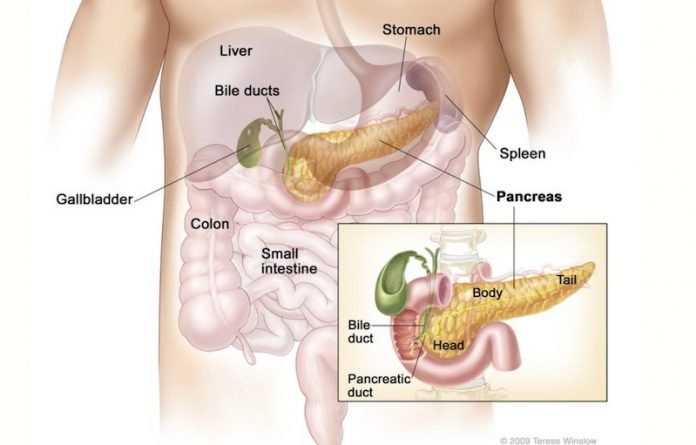
In a study from Mayo Clinic Comprehensive Cancer Center, scientists found a gene marker that may lead to a more effective, precision treatment for pancreatic ductal adenocarcinoma (PDAC).
While Poly-ADP-ribose-polymerase inhibitors (PARPi) are now an FDA-approved option for standard maintenance therapy for patients with metastatic PDAC who harbor pathogenic germline BRCA1/2 mutations, only about 10 percent of patients with PDAC harbor pathogenic mutations of the homologous recombination (HR) genes.
In this study, the team found that the protein METTL16 may be a new biomarker for PARPi treatment and that PDAC with elevated expression of METTL16, may benefit from PARPi treatment.
METTL16, belongs to a family of factors that regulate RNA methylation, whose function in DNA repair is unclear.
The team found that METTL16 expression was correlated with accumulated DNA damage in a PDAC microarray.
They say elevated METTL16 may result in HR DNA repair defects, which may lead to accelerated aging, disease or increased risk of cancer.
The research showed that METTL16 suppresses DNA repair via interaction with a key DNA repair nuclease called MRE11.
The team found that METTL16 unexpectedly bound with MRE11 not through direct protein-to-protein interaction but through RNA.
Because METTL16 is highly expressed in a subset of PDAC and inhibits HR, PDAC cells with high METTL16 expression showed increased sensitivity to PARPi in both cellular and mouse models, especially when combined with gemcitabine.
These findings may suggest that in addition to PDAC with BRCA1/2 mutation, PDAC without BRCA1/2 mutation, but with elevated expression of METTL16, may also be a target for PARPi treatment.
In addition, the treatment strategy of gemcitabine combined with PARPi may be more beneficial.
The team believes immunochemistry-based METTL16 expression detection of tumors may eventually become a routine clinical practice for patients before starting treatment.
If you care about cancer prevention, please read about studies about how to reduce pancreatic cancer spread by nearly 90%, and scientists find a new way to kill pancreatic cancer.
For more information about cancer risk, please see recent studies about drug that can strengthen immune system to fight cancer, and results showing Aspirin may boost survival in these two cancers.
The study was conducted by Zhenkun Lou et al and published in Nature Cancer.
Copyright © 2022 Knowridge Science Report. All rights reserved.



